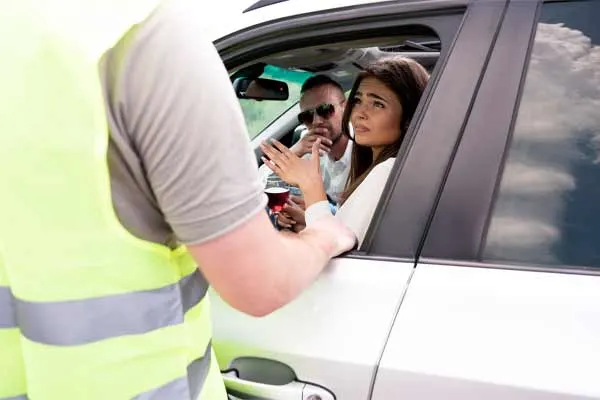If a law enforcement officer pulls you over at a traffic stop on suspicion of drunk driving, the officer will ask you to perform various types of field sobriety tests. The officer will also ask you to take a breathalyzer test. It’s essential to note that you aren’t under arrest and you haven’t been charged with any crime at this point. Law enforcement officers use these highly subjective tests to help them build a case. Often, it’s in your best interest to refusing a field sobriety test in Illinois and to refuse to submit to the initial breathalyzer test, but doing so could cause your arrest.
At the Dohman Law Group, our DUI defense attorneys have successfully handled many DUI cases throughout Cook County, DuPage County, Kane County, Lake County, and throughout Illinois. If you have been charged with impaired driving, it’s essential you contact us immediately at (847) 616-9993 so we can protect your rights while we build you the strongest defense possible.
Can You Refuse a Field Sobriety Test in Illinois?
It’s in your best interest to refuse a field sobriety test. Because field sobriety tests are open to the subjective opinion of the police officer who pulled you over, and who most probably will be biased against you because he or she pulled you over.
Further, there are many factors that might cause you to perform poorly on field sobriety tests, regardless of your intoxication level. These include:
- Bad weather;
- Lack of enough sleep;
- Traffic speeding by on the side of the roadway;
- Fear and intimidation from interacting with police officers;
- Poor coordination

Also, there are many reasons why you should refuse a field sobriety test, including:
- None of the field sobriety tests are 100% accurate in determining the level of intoxication in a person.
- Incorrect administration and bias by law enforcement often taint the accuracy of field sobriety tests.
- Just because you pass the test doesn’t mean the police officer will let you go. There are many instances when a person passes the field sobriety test and the police still bring them in and charge them with drunk driving.
- Illinois law doesn’t obligate any person to take a field sobriety test.
- Field sobriety tests give law enforcement extra evidence they can use against you in a court of law.
- A sobriety test is more likely to incriminate you rather than exonerate you.
What Happens if You Refuse Testing When Pulled Over for a DUI?
Typically, police officers use field sobriety tests to get a better idea of whether a driver is under the influence of drugs or alcohol. During intoxicated driving assessments, police officers administer three types of standardized field sobriety tests. Many scientific studies have been done that reportedly show these standardized tests are reliable for gauging intoxication levels. The standardized field sobriety tests include the horizontal gaze nystagmus test, one-leg-stand test, and walk-and-turn test. However, unlike with chemical testing, there’s no legal penalty for refusing to take a field sobriety test.
Often, if a law enforcement officer has probable cause to believe that a person is driving under the influence, the “implied consent laws” in Illinois require the person to take a chemical test, including a blood, breath, or urine test, to determine their blood alcohol concentration. Implied consent laws state that by just driving on the road, a driver is agreeing to take a chemical test to determine their blood alcohol content. Implied consent laws vary from state to state, especially regarding which chemical test is required—but every state enforces.
A driver who unlawfully refuses to take roadside chemical tests faces severe consequences—normally worse than if they were just found guilty of driving under the influence of drugs or alcohol. Based on the circumstances, a chemical test refusal can cause license suspension, jail time, hefty fines, and having to install a breath alcohol ignition interlock device (BAIID). Further, if the DUI case goes to trial, the prosecutor can use your refusal against you by arguing that you knew you were impaired and that’s why you refused to take the chemical test.
The Illinois Secretary of State automatically suspends a DUI offender’s driving privileges for refusing chemical testing. The driver’s license suspension periods include:
- one year, if the offender doesn’t have a previous DUI conviction or statutory summary suspension within the last five years, and
- three years, if the defendant has a previous drunk driving conviction or a statutory summary suspension with the last five years.
The statutory summary suspension comes into force on the 46th day after the date the DUI offender receives the notice. Typically, the arresting police officer takes possession of the DUI offender’s license at the time of the DUI arrest and issues a 45-day driving permit.
Can You Refuse a Breathalyzer if Under 21?
Many people have a misconception that they must take a breathalyzer test any time a police officer asks them to do so. However, this isn’t true. What is true is that a person suspected of driving under the influence of alcohol or drugs must submit to a chemical blood test or a certified breath test, otherwise, he or she will lose their driver’s license for a year for the refusal. Thus, you’re obligated to take a breath test while under investigation for public drunkenness or underage drinking.

What Do Cops Look for During a Sobriety Test?
Field sobriety tests are a group of three tests that police officers use to determine if a driver is driving under influence of alcohol or drugs. The tests assess coordination, balance, and the ability of the person to divide his or her attention to more than one task during the field sobriety testing. In 90% of cases, sobriety testing is scientifically proven to validate legal intoxication among drivers suspected of impaired driving, especially when administered by a trained law enforcement officer. Results of field sobriety tests are admissible as evidence in court.
The National Highway Traffic Safety Administration describes the three parts of the standardized field sobriety test. If a driver fails any of the field sobriety tests, the police will then ask the person to take a breath test or a chemical test to determine their blood alcohol level. The standardized field sobriety test is a group of three tests, which includes the one-leg stand, the horizontal gaze nystagmus (HGN), and the walk-and-turn tests.
Our Lawyers Can Help You After Refusing a Field Sobriety Test in Illinois
Law enforcement officers commonly use field sobriety tests to assist them in establishing if a person was driving under the influence of alcohol or drugs. While these tests are often said to be subjective and unreliable, they may cause an arrest for drunk driving. If you or a loved one are facing a misdemeanor DUI offense or felony DUI charge, a Cook County DUI criminal defense lawyer can guide you through the legal proceedings while protecting your constitutional rights. At Dohman Law Group, our skilled DUI criminal defense lawyers can scrutinize field sobriety tests for any weaknesses that may assist in your defense.
With law offices in Aurora in DuPage County, we provide criminal defense services to clients throughout DuPage County, Cook County, Kane County, Lake County, Will County, and throughout Illinois. To schedule a free initial consultation, call our personal injury law firm today at (847) 616-9993, or chat with us online to learn how we can help.


